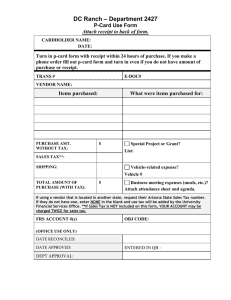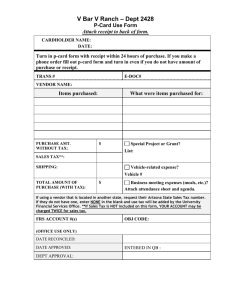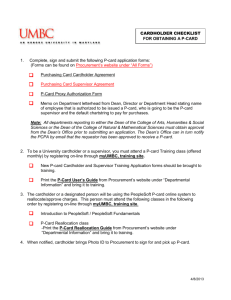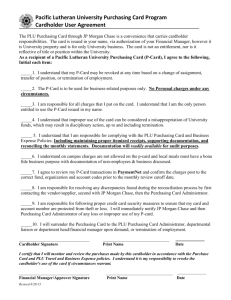P-Card Newsletter and P-Card Reconciliation
advertisement
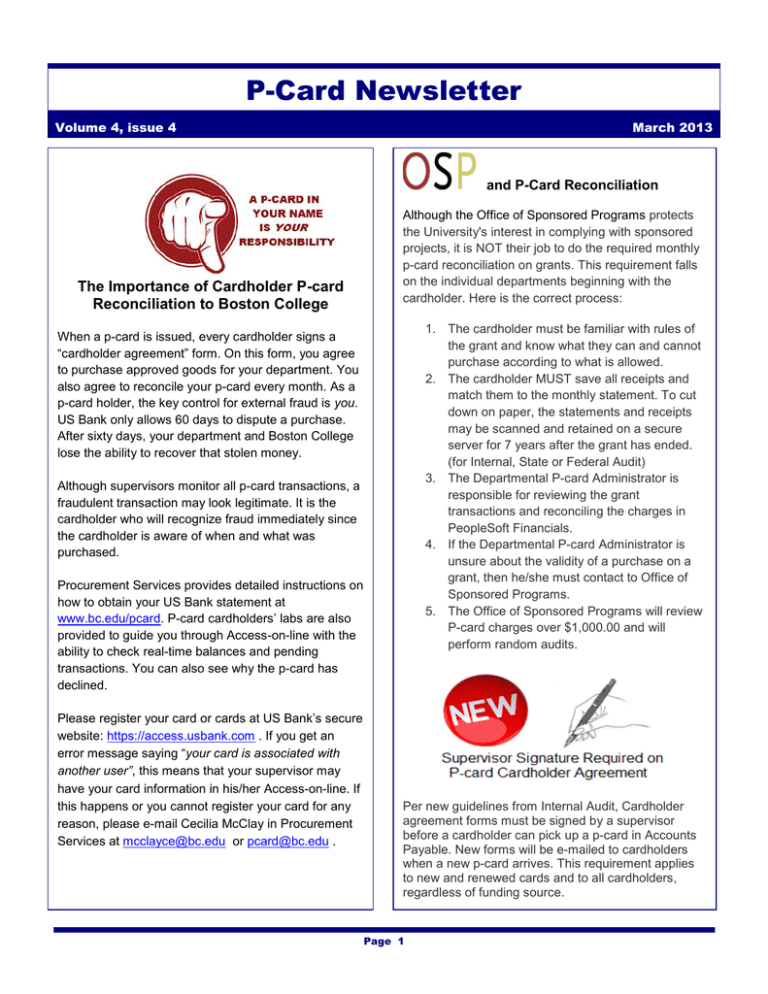
P-Card Newsletter Volume 4, issue 4 March 2013 and P-Card Reconciliation The Importance of Cardholder P-card Reconciliation to Boston College Although the Office of Sponsored Programs protects the University's interest in complying with sponsored projects, it is NOT their job to do the required monthly p-card reconciliation on grants. This requirement falls on the individual departments beginning with the cardholder. Here is the correct process: 1. The cardholder must be familiar with rules of the grant and know what they can and cannot purchase according to what is allowed. 2. The cardholder MUST save all receipts and match them to the monthly statement. To cut down on paper, the statements and receipts may be scanned and retained on a secure server for 7 years after the grant has ended. (for Internal, State or Federal Audit) 3. The Departmental P-card Administrator is responsible for reviewing the grant transactions and reconciling the charges in PeopleSoft Financials. 4. If the Departmental P-card Administrator is unsure about the validity of a purchase on a grant, then he/she must contact to Office of Sponsored Programs. 5. The Office of Sponsored Programs will review P-card charges over $1,000.00 and will perform random audits. When a p-card is issued, every cardholder signs a “cardholder agreement” form. On this form, you agree to purchase approved goods for your department. You also agree to reconcile your p-card every month. As a p-card holder, the key control for external fraud is you. US Bank only allows 60 days to dispute a purchase. After sixty days, your department and Boston College lose the ability to recover that stolen money. Although supervisors monitor all p-card transactions, a fraudulent transaction may look legitimate. It is the cardholder who will recognize fraud immediately since the cardholder is aware of when and what was purchased. Procurement Services provides detailed instructions on how to obtain your US Bank statement at www.bc.edu/pcard. P-card cardholders’ labs are also provided to guide you through Access-on-line with the ability to check real-time balances and pending transactions. You can also see why the p-card has declined. Please register your card or cards at US Bank’s secure website: https://access.usbank.com . If you get an error message saying “your card is associated with another user”, this means that your supervisor may have your card information in his/her Access-on-line. If this happens or you cannot register your card for any reason, please e-mail Cecilia McClay in Procurement Services at mcclayce@bc.edu or pcard@bc.edu . Per new guidelines from Internal Audit, Cardholder agreement forms must be signed by a supervisor before a cardholder can pick up a p-card in Accounts Payable. New forms will be e-mailed to cardholders when a new p-card arrives. This requirement applies to new and renewed cards and to all cardholders, regardless of funding source. Page 1 Volume 4, issue 4 P-Card Newsletter March 2013 A few notes about credit card surcharges: Per federal guidelines, the surcharge must be a separate line-item on the receipt. Here is an example: Credit Card Surcharges In 2005, a class-action, anti-trust lawsuit was brought against VISA and MasterCard, accusing them and some of the largest banks in the United States of setting a swipe fee to businesses every time a customer uses a credit card. Businesses were not allowed to charge a customer that fee back to recover the cost. In 2012, a settlement was reached allowing a vendor to add a surcharge to a transaction of 1-4% of that transaction beginning January 2013. To offset this federal ruling, ten states have already implemented rules which do not allow surcharges to consumers for businesses located in the following states: California, Colorado, Connecticut, Florida, Kansas, Maine, Massachusetts, New York, Oklahoma and Texas. Many states may follow (New Jersey and Washington) but for now, if you purchase something on P-card from one of the remaining states, you may see this surcharge on your receipt. How will this affect Boston College and department budgets? Procurement Services does not anticipate a great impact on p-card, however, it is something to be aware of and it may impact your decision (and Procurement’s) to do business with certain companies that decide to move forward with adding a surcharge to a purchase. Big retailers such as Walmart, Target, Macys, Sears, McDonalds, The Gap, JC Penney, Neiman Marcus, Home Depot and Lowes have announced publically that they will not impose a surcharge on their customers. More than likely, it will be the small businesses who will impose it. As part of our on-going effort to monitor these new changes, and to ensure compliance, please contact Procurement Services at pcard@bc.edu if you are charged a surcharge from any vendor. Page 2 Surcharges are not allowed on debit cards or American Express cards. Pcard@bc.edu mailbox: I’m still having a difficult time trying to get my p-card approved at Amazon UK even though I corrected the billing address after my first decline and increased the budget after the second decline. Lori Dear Lori, I checked your card and it’s approving on our end but declining on their end. The UK and other foreign purchases go through a vigorous authorization process. If the card declines twice, they will lock your card out of that purchase forever. I would suggest trying another p-card in the same department for that purchase. For the future, please make sure you have the correct billing address and phone number associated with the card, enough budget and try not to make any errors on the expiration date and security code listed on the back of the card. Otherwise, when you get repeated declines, they treat it as a fraud attempt and lock the card, which is a common practice since fraud is on the rise everywhere.
